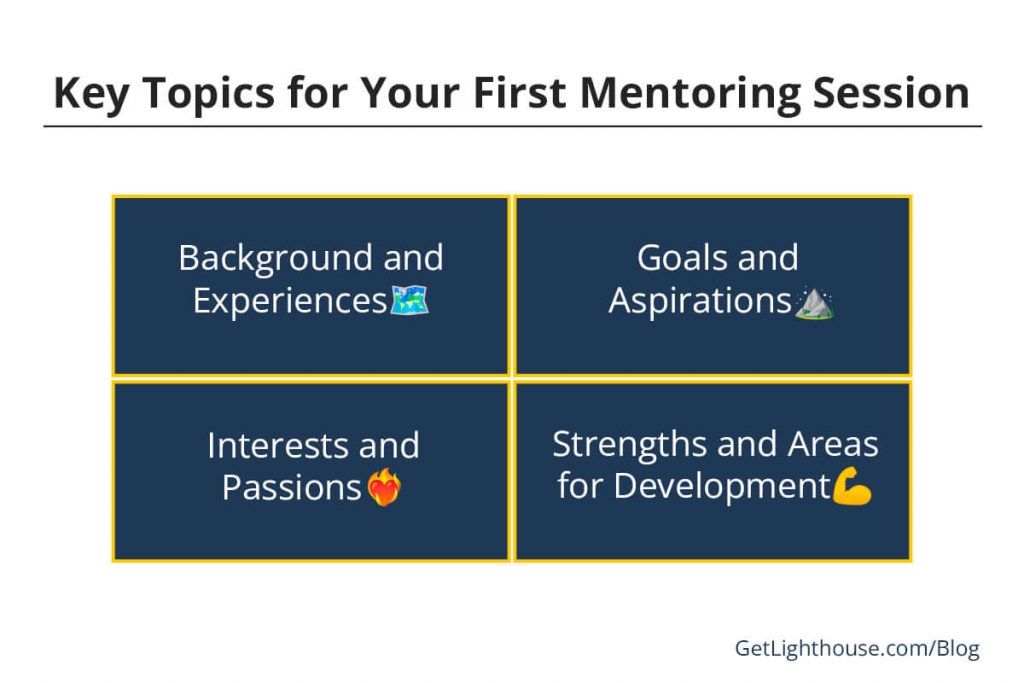“Joe made a *huge* difference in my career. I advanced much faster than I would have on my own.”
“Tina’s guidance helped me navigate a really uncertain workplace. I don’t think I would have made it without her”
“Vikram showed me how to get noticed and build the skills that unlocked my career.”
These are the kinds of things people say when they have a mentor that really makes a difference. I know, because I was lucky to have a few amazing people guide me early in my career.
Yet, just because you get introduced to or paired with a mentor doesn’t mean you’ll have the same kind of experience. And just because you get tapped to be a mentor doesn’t mean your mentee will have a great experience, either.
Your mindset as a mentor makes all the difference
The truth is, as much as you hope your mentee makes it easy for you, it's also important for you, as a mentor, to come prepared, too.
And how do you do that? By asking the right questions.
This is not just about breaking the ice; it's about sparking deep, meaningful conversations that lead to their growth and development and the kind of relationship you’re excited to be a part of.
If you haven’t done mentoring sessions before, our guide to first-time mentoring meetings is a great place to start. For those with some experience looking to become a better mentor, you're in the right place with us today.
Today’s post covers a range of mentoring questions to ask your mentee that will help you make the most of your mentor sessions from Day 1 to Day 1001. Here’s what we will be covering:
Table of contents:
- Questions to Build Rapport in the First Mentoring Session
- Questions About Working Well Together
- Growth and Strategic Questions to Ask Your Mentee
- Check in on Your Relationship with these Questions to Ask Your Mentee
- Tips for Making the Most of Your Time with Mentees
Questions to Build Rapport in the First Mentoring Session
Your first mentoring session sets the tone for your relationship. This meeting is your opportunity to build a strong foundation for your mentor-mentee relationships.
Rather than jumping right into business objectives and any mandates you received on how to spend your time with them, use this first meeting to get to know each other.
You need to make your mentee feel comfortable opening up to you, because that will make future conversations easier. If they’re not willing to share vulnerable context with you, or don’t take your feedback to heart, your sessions won’t be useful for either of you.
The 4 Key Topics to Cover on Day 1
Here are some topics to cover that can help both of you get acquainted and set clear expectations:

- Background and Experiences: Understanding their past experiences, both professional and personal, can help you empathize with them and tailor your mentorship to fit who they are.
- Goals and Aspirations: Discussing what your mentee hopes to achieve with you and in general in their career helps you maximize your impact and manage their expectations.
- Interests and Passions: Learning each other’s passions outside of work builds stronger rapport, which makes the rest of your relationship easier and more enjoyable.
- Strengths and Areas for Development: Identifying what they already know they need to work on helps you focus your mentorship on the most impactful areas from day 1.
By focusing on these topics, you can start your mentor-mentee relationship on the best footing.
Now let’s get a little bit more specific and take a look at the questions that you can ask to reveal these things when you first meet your mentee.
Icebreaker Questions to Ask Mentee in the First Meeting
- What inspired you to pursue your current career path?
- How did you get into this role? What made you want to be a [role]?
- What is a recent achievement or project you're proud of? What aspect are you most proud of? Why that?
- What's a book or article that recently made an impact on you?
- Outside of work, what are you passionate about? What are your hobbies?
- What's something you've always wanted to learn but haven't yet?
- What do you think I should know about you that will help me be a better mentor for you?
- What’s something about you that might surprise me?
- I looked up a bit about you and saw [X]. Can you tell me more about that? (Ask something interesting about their background, where they went to school, past jobs, et)
- (If they had a say in it) What made you interested in working with me as your mentor?
- What do you feel are your strengths? How have you been leveraging those lately at work?
- What areas do you feel you need to work on or improve most? Why did you choose those?
These questions are a good starting point, but don’t feel like you need to read them all word-for-word, or even ask them all. Tweak them to fit your personality, and use your best judgment on what fits best for your situation and personality.
Further reading:
You can build rapport with anyone, if you ask the right questions. Learn how in our post — Your Guide To Building Good Rapport With Anyone You Work With.

Questions About Working Well Together
Once you’ve built some rapport by getting to know them, the next step is to start establishing the basics of how you’ll work together going forward.
Your goal is to learn what it will take for you both to thrive in the relationship.
If you know what setup or approach helps your mentee learn and grow best, why not tweak your approach to match?
These kinds of small tweaks are how you make a big impact; you’ll coach them better, and they’ll appreciate your effort to accommodate them. Often, this will also make them more open to your requests, too.
Building a strong working relationship
Your goal now is to dive into the specifics of your mentorship program. If you have explicit guidance from your company or program, make sure you review it with them, so they know what you know.
At the same time, you should also get to know your mentee from a work perspective.
Knowing your mentee's preferences, challenges, and expectations can be a game changer in how you guide them. You’ll want to learn things like:
- What your mentee hopes to gain most, so you can adapt to their goals, or reset expectations if they’re getting ahead of themselves.
- Learn how much time they can dedicate to actions between sessions, so you don’t overload them, or expect more than they can manage.
- Discover how they best learn so you can tailor your advice, coaching, and recommendations accordingly.
Here are some mentoring questions to reveal these sorts of things and help you create a great relationship with your mentee as you start working together.
Questions to understand work relationships with your mentee
- What format do you prefer for learning? (Books vs. videos vs. podcasts vs. blogs, etc)
- What format doesn’t work well for you learning? Why? (Avoid sharing too many of these)
- What’s most important to you in our mentor-mentee relationship? What do you want to get out of this?
- What’s your workload like right now?
- How much time do you think you can spend each week working on things we talk about and work on together? (Sets your expectations on what you can assign them)
- What has been your experience with mentorship in the past? What worked well and what didn't?
- What have past mentors, managers, or coaches done that you’d like me to do as well? What did you appreciate about that?
- What have past mentors, managers, or coaches done that you do *not* want me to do? What did you dislike about that?
- How do you prefer to communicate (e.g., email, text, video message, etc) between sessions?
- What do you find most helpful for me to cover in our sessions here? Do you want more stories, examples, get tactical with your problems, or another approach?
Further reading:
These are similar to what you’ll ask a new hire on your team, which you can learn about here:

Growth and Strategic Questions to Ask Your Mentee
Now that we’ve covered the basics of getting to know them, building some rapport, and learning how you can best work together, it’s time to get into the real meat of your relationship: their long term goals.
Understanding your mentee’s vision for their career, the current situation, and the challenges they have now are crucial for being the best mentor you can be.
Knowing these things helps you set off in the right direction going forward.
While it's helpful to gather information about this from their manager, LinkedIn profile, or other available sources, asking your mentee directly helps clarify those other sources, as well as recognize if any of them are outdated.
Keep in mind: This conversation is not just about filling in gaps; it's about understanding their aspirations, motivations, and perceived obstacles as they see it. If your heard something very different from their manager than they tell you, then you have a very different set of next steps than if they’re in agreement.
Regardless of what you learn, the first step is to make time to ask, so here are questions you can use to reveal how your mentee sees their current circumstances and long term growth goals.
Key Strategic Questions to ask your mentee
- Where do you want to be in 5 years? What are your long-term career goals?
- What is the next major milestone you want to reach in your career? Where are you now in relation to this? How is it going?
- What obstacles and challenges do you foresee in trying to reach your career goals? How do you think you can overcome them?
- How do you feel you're progressing in your career? Are you satisfied? Why/why not?
- What has your manager told you that you need to work on or improve most? What progress have you made on this so far? What have you tried?
- What have your peers told you that you need to work on or improve most? What progress have you made on this so far? What have you tried?
- What are you doing on your own to work on your career development? How is that going? (look for signs like taking courses/training, going to school at night, reading books, etc)
- What do you feel are your strengths in your current role? How do you get to use them currently?
- What are your weaknesses right now? How are you working to improve them?
- Do you have a career ladder at work with clear skills to master? (If yes, ask them to share with you to help you mentor them better)
- Would you be willing to share any recent evaluations of your work with me so that I can better get to know where you’re at in your career now and things we could work on together? Who should I talk to to get that? (Think review a recent 360, performance review, evaluations, leveling and promotion notes, etc)
These questions are all about gaining a baseline understanding of your mentee’s present situation and where they’re trying to go. Context is everything, which is why there’s a variety of styles of questions to try to triangulate what reality is.
You only see your mentee a few hours per month, so it’s important you build a strong foundation of understanding of them by asking these questions or similar ones.
Further reading:
If your mentee has some problems with identifying their career goals, then this post can help — 6 Proven Ways To Help When Your Team Member Can't Answer "What Are Your Career Goals?
Check in on Your Relationship with these Questions to Ask Your Mentee
As you work together to solve different challenges and help them grow, it can be easy to fall into a routine of troubleshooting their latest situation.
However, it can be invaluable to also occasionally check in on how your work together is going at a high level. Stepping back to discuss how you work together helps keep you both on track and working together as best you can.
By taking a few minutes to check in on your mentor-mentee relationship, you’ll identify small (and sometimes big) ways to improve your relationship. But that only happens if you take the time to ask.
Engage your mentee with these questions to understand their perspective on your relationship and to identify key areas for improvement:
Questions to Ask your Mentee about your relationship
- What have been the most valuable parts of us working together? What should we do more of?
- What’s been the most difficult part about us working together? What’s not working well?
- If you could change anything about our mentoring sessions and what we do between sessions, what would you change? Why that?
- What, if any, context do you feel I’ve been missing about how your work is different than the situations we talk about in our sessions? (To identify any blind spots you have)
- How could I improve as a mentor for you? What feedback do you have for me so far?
- How do you feel about your career progress right now? What areas do you think need the most work now?
By proactively asking these questions, you can make minor course corrections over time that really add up. This also helps you avoid any shocking scenarios where they suddenly tell you they don’t want you as a mentor anymore.

Tips for Making the Most of Your Time with Mentees
Asking thoughtful questions is key to being a great mentor. It helps you learn valuable context, build a stronger relationship, and course correct if any issues arise.
However, knowing to ask mentor questions is only the beginning; it is not just what you ask, but also how you ask it that matters.
Let’s take a look at some final tips that will help you improve your skills in asking good questions to your mentee. These can be applied well beyond just mentorship, but are especially powerful in this case.
Ask Open-Ended vs Closed Questions
Open-ended questions spark deeper reflection and create a dialogue between you and your mentee. This is much better than trying to learn from questions that can be answered yes/no or with other one-word responses.
The best way to start asking more open-ended questions is to open your questions with "What" or "How". You can’t answer them yes or no, and they require some explanation.
This simple shift can transform your relationships, because it gets them talking more and avoids you making any assumptions when they simply say “yes” or “no” to something you ask.
Actively Listen with Follow-Up Questions
Don't just passively accept surface-level answers. Use active listening to dive deeper.
When you hear something interesting from your mentee, follow up with questions like "What makes you say that?" or "Can you give me a specific example?" to get more information.
Then, to ensure you really understand them, try rephrasing what you heard and asking them to confirm if you got it right. Often, you’ll find you missed something important to them, and they’ll take the opportunity to happily clarify.
Even better, when you do get it fully, you’ll see a sense of relief on their face; most people don’t take the time to make sure they really get everything, but making people feel heard is one of the best ways to be a great listener and leader.
Challenge Your Mentee to Think Through Answers
It can be a great stroke to your ego to feel like you have all the answers, but that may not always be the best way for your mentee to learn.
Before you rush to provide all the answers, encourage your mentee to come up with their own solutions.
Ask them, "How would you approach this?" or "What have you tried so far?" You can also ask how they would tackle the issue presented and where they have gaps.
By having them think through how they’d solve it, or reflect on what they’ve already tried, you’re helping them expand their knowledge and skills. You’re stretching their thinking, and allowing you to see how they approach problems.
Not only does this further develop their independence, but it allows you to see how they think in ways that you can then coach as well. This is how your mentorship can go from being a series of one-off solutions, to 10X guidance that rapidly levels them up.
Yet, it only happens if you resist the temptation to be the wise mentor with all the answers.
Set Clear Expectations Between Sessions
Your advice, suggestions, further reading, and tips are only as useful as how well they’re applied.
This is a two-way street: Yes, it’s on your mentee to do their part and follow through, but it’s also your responsibility to make things clear and easy to follow.
To make sure your mentee makes real progress between sessions:
- Set clear next steps: Being vague and general in your suggestions makes it hard to apply them. Tell your mentee exactly what steps to take to make sure they know what to do.
- Make mini-milestones: If they have a big task ahead of them, set some mini-milestones they can achieve by your next session. This makes an ask less intimidating and gives them a sense of progress. You also can then coach them on how that went.
- Keep your promises: If you expect them to do their part, you need to do yours as well. If you promise to make an intro, send a note, or otherwise followup between sessions, make sure you do. Otherwise, you have no room to complain if they don’t do their part.
- Check back in next time: Never assume everything worked perfectly. Ask them how prior next steps turned out to see what’s working and what can improve in your sessions.
These simple tweaks to how you both work between sessions can make all the difference. Combined, they help you build great momentum and maximize your time together.
Final Word
To be a great mentor, you need to go the extra mile for your mentee. That doesn’t just mean giving good advice, or making sure they get their next promotion.
To become an exceptional mentor, you must take time to get to know your mentees, develop a strong understanding of their goals and current challenges, and find the best ways to uniquely work together.
As you have learned today, the best way to accomplish all of that is by asking thoughtful mentoring questions.
When you pair that with being fully present during your sessions, as well as actively listening and asking great questions, you create a deeper dialogue and connection with each of your mentees.
Remember, the rewards for doing all of this are significant. Being known as a great mentor can:
- Help you rise faster as a leader, either because they know you can handle managing and growing people, or because the positive impact on those people is recognized.
- Creates your first testimonials if you ever decided to become a coach or consultant.
- Make you a more appealing hire at your next job, if the company values mentorship and growth.
- Be a great reference when needed for jobs, charity boards, and other opportunities later in your career.
While there are many reasons to become a mentor, we hope you’ll make the most of your investment in others by following our tips today.
Further Reading:
If you want to learn more about becoming an amazing mentor beloved by mentees and making a real impact, start with these posts:
- Your First Mentorship Meeting: A Guide For Mentors & Mentees — an essential read for starting on the right foot whether you are a mentor or mentee.
- 37 Key Questions To Ask A Mentor To Transform Your Career — a great guide you can share with your mentees to help them, too.





